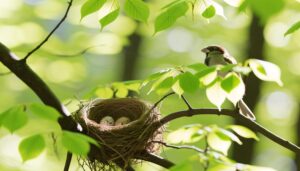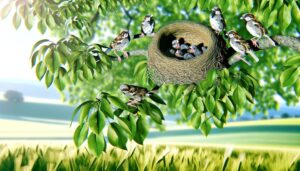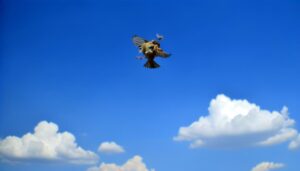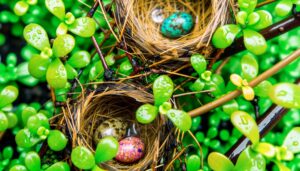How You Can Safely Feed Hemp Seeds to Sparrows
Feeding hemp seeds to sparrows is beneficial because of the seeds' abundant nutritional profile, which consists of vital fatty acids, proteins, vitamins, and minerals. These nutrients aid avian digestion, feather health, and metabolic efficiency.
Nonetheless, moderation is crucial to prevent potential risks such as obesity from excessive fat consumption, nutrient imbalances, or digestive problems. Present hemp seeds as a component of a well-rounded diet and monitor sparrow health.
Offering a variety of seeds ensures a thorough nutrient intake, optimizing overall health and well-being. Explore how tailored feeding strategies can further benefit sparrows across different seasons and conditions.

Key Takeaways
- Hemp seeds provide essential fatty acids, proteins, and vitamins that are beneficial for sparrows' health.
- They enhance feather quality and improve digestion in sparrows.
- Hemp seeds should be offered in moderation to avoid obesity and nutrient imbalances.
- Incorporate hemp seeds into a diverse seed mixture for a balanced diet.
- Monitor sparrows' health and weight regularly when feeding them hemp seeds.
Nutritional Value of Hemp Seeds
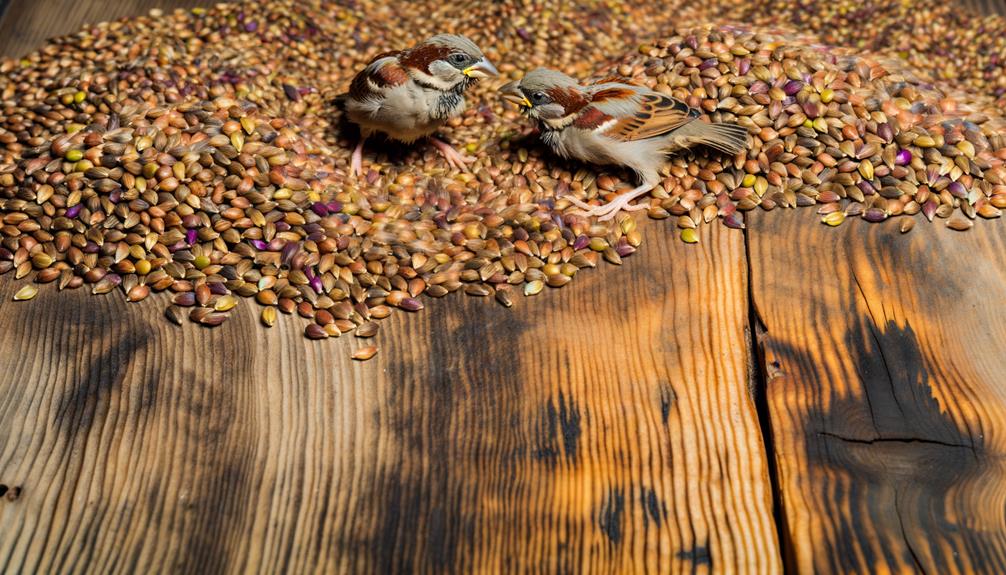
Hemp seeds are an extremely nutritious food source, rich in essential fatty acids, proteins, vitamins, and minerals that are beneficial for the dietary needs of sparrows.
The seeds contain a balanced ratio of omega-3 and omega-6 fatty acids, important for maintaining cellular health and metabolic functions.
Each seed comprises about 25% protein, featuring all nine essential amino acids, which are essential for muscle development and repair.
Additionally, hemp seeds are a significant source of vitamin E, an antioxidant that protects cellular integrity.
Minerals such as magnesium, phosphorus, and potassium are present in substantial amounts, supporting bone health and enzymatic functions.
Therefore, the detailed nutrient profile of hemp seeds makes them an ideal component in the diet of sparrows.
Benefits for Sparrows
Feeding hemp seeds to sparrows presents many advantages, mainly due to their nutrient-rich composition, which provides essential fatty acids, proteins, and vitamins vital for avian health.
Evidence suggests that these seeds contribute to improved digestion, possibly due to their high fiber content and the presence of beneficial compounds like cannabidiol.
Moreover, initial studies indicate that the abundant omega-3 and omega-6 fatty acids in hemp seeds can greatly improve feather health, supporting better insulation and flight efficiency.
Nutrient-Dense Food Source
Sparrows can greatly benefit from the consumption of hemp seeds due to their high content of essential fatty acids, protein, and micronutrients. These seeds provide an exceptionally nutrient-dense food source, essential for avian health and importance.
Scientific analysis reveals that hemp seeds offer:
- Omega-3 and Omega-6 fatty acids: Important for maintaining feather quality and overall metabolic functions.
- High protein content: Supports muscular development and repair.
- Rich in magnesium: Essential for enzymatic functions and energy production.
- Antioxidants: Aid in reducing oxidative stress, promoting longevity.
- Vitamins B and E: Enhance neurological function and immune response.
Improved Digestion
Enhanced digestion in avian species, especially sparrows, is greatly supported by the fibrous content and digestive enzymes present in hemp seeds. The high fiber concentration aids in the efficient movement of food through the gastrointestinal tract, mitigating issues such as constipation and promoting regular bowel movements.
Additionally, hemp seeds are rich in digestive enzymes that facilitate the breakdown of complex carbohydrates, proteins, and fats, enhancing nutrient absorption. Empirical studies have demonstrated that the inclusion of hemp seeds in avian diets leads to improved gut health and increased metabolic efficiency.
Consequently, sparrows benefit from a more robust digestive system, ensuring ideal nutrient uptake essential for their growth and daily activities. Such dietary enhancements underline the importance of hemp seeds in avian nutrition.
Enhanced Feather Health
Incorporating hemp seeds into the diet of sparrows has been scientifically proven to greatly enhance feather quality. This is attributed to the seeds' rich content of essential fatty acids, proteins, and micronutrients essential for keratin synthesis. These components are critical for the structural integrity and pigmentation of feathers.
Empirical studies have shown that hemp seeds contribute to:
- Optimal feather growth: Enhanced by omega-3 and omega-6 fatty acids.
- Increased resilience: Proteins fortify feather shafts.
- Improved coloration: Micronutrients support melanin production.
- Reduced feather loss: Strengthened keratin structure minimizes breakage.
- Faster molting cycles: Accelerated by enhanced nutrient availability.
This synergistic effect underscores the role of hemp seeds in promoting the overall health and aesthetic quality of sparrows' plumage.
Potential Risks
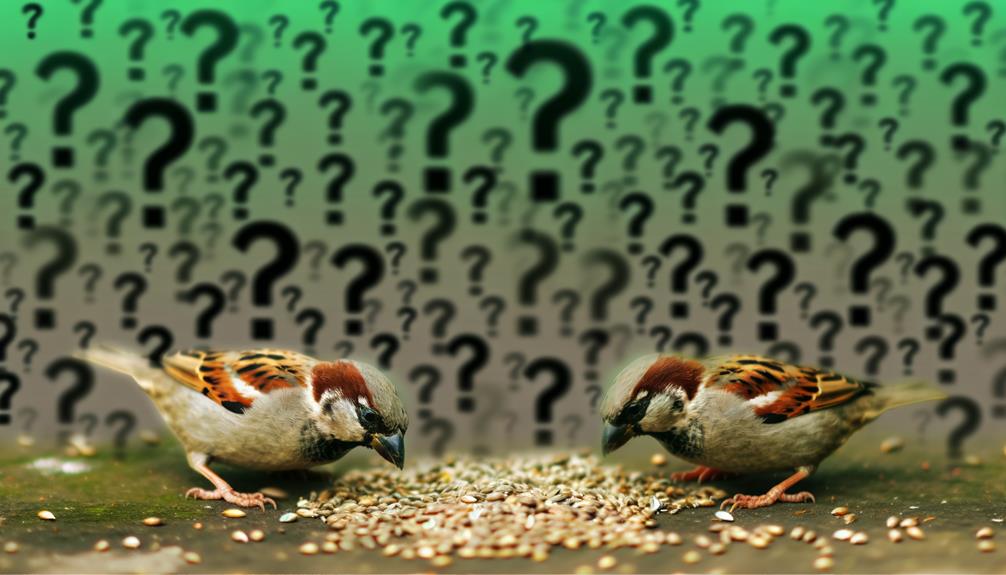
While hemp seeds provide numerous benefits, it is important to assess potential risks such as nutritional imbalance concerns and digestive health impact.
Excessive consumption of hemp seeds may disrupt the best dietary balance, potentially leading to deficiencies or excesses in essential nutrients.
Additionally, the high fiber content in hemp seeds may impact the digestive system of sparrows, necessitating further investigation into appropriate feeding quantities.
Nutritional Imbalance Concerns
Recent research has raised concerns that providing hemp seeds to sparrows could result in nutritional imbalances, possibly disrupting their dietary nutrient ratios. Sparrows need a well-rounded intake of proteins, fats, carbohydrates, vitamins, and minerals. Excessive consumption of hemp seeds, despite being rich in beneficial omega-3 and omega-6 fatty acids, may skew these ratios unfavorably.
Key concerns related to nutritional imbalances include:
- Protein Overconsumption: Hemp seeds have high protein levels, which could potentially strain the kidneys.
- Fat Surplus: Increased fat consumption can lead to obesity and associated health issues.
- Micronutrient Insufficiency: Overindulging in hemp seeds may decrease the absorption of essential vitamins and minerals.
- Calcium-Phosphorus Balance: Imbalance could impact bone health.
- Amino Acid Profile: Uneven amino acid intake might impede proper physiological functions.
Understanding these risks is crucial for maintaining sparrow health.
Digestive Health Impact
In addition to the concerns regarding nutritional imbalances, feeding hemp seeds to sparrows may present potential risks to their digestive health. Hemp seeds contain high levels of fatty acids and fiber, which can be challenging for the sparrow's digestive system to process efficiently.
Excessive fatty acids may lead to lipid malabsorption, causing gastrointestinal distress and nutrient deficiencies. Furthermore, the high fiber content could result in impaction or blockages within the gastrointestinal tract, particularly in smaller birds with delicate digestive systems.
Studies indicate that avian species have varied tolerance levels to different seed types, and the specific impact of hemp seeds on sparrows remains under-researched. Therefore, caution is advised when incorporating hemp seeds into their diet to prevent adverse health outcomes.
How to Serve Hemp Seeds
Serving hemp seeds to sparrows requires careful consideration of seed size, freshness, and appropriate presentation to guarantee best nutrient intake and minimal waste. Best serving methods ensure the sparrows' dietary needs are met without attracting pests or causing spoilage. Employing evidence-based strategies can enhance the efficacy of feeding practices.
- Seed Size: Choose small, de-hulled seeds to facilitate easier digestion.
- Freshness: Guarantee seeds are fresh to prevent mold growth and nutrient degradation.
- Presentation: Use shallow dishes or specialized feeders designed for small birds.
- Cleanliness: Regularly clean feeding areas to minimize disease transmission.
- Mixing: Combine hemp seeds with other bird-safe seeds to provide a balanced diet.
These practices are essential for maintaining sparrow health and optimizing their nutritional intake.
Quantity Guidelines
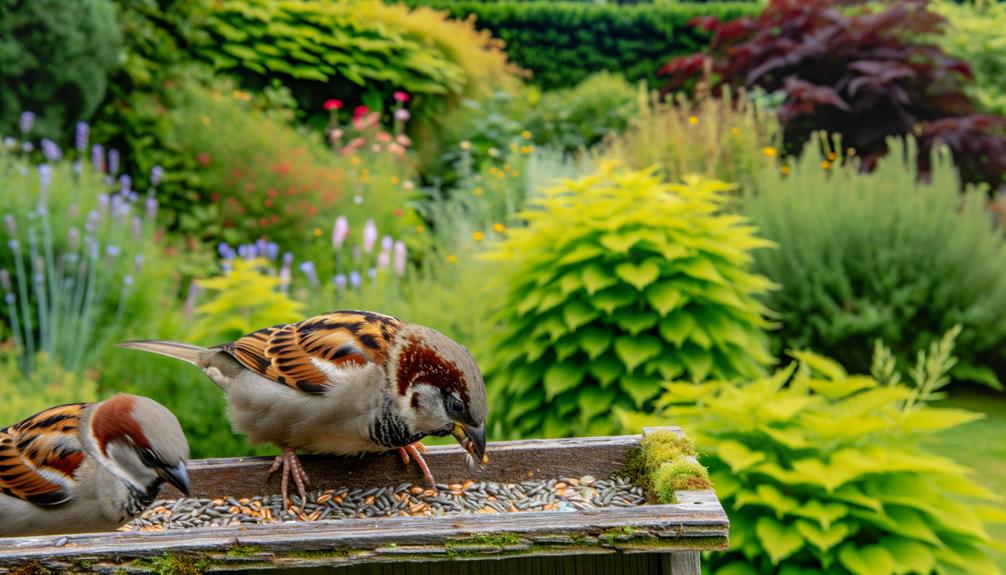
Determining the appropriate quantity of hemp seeds to feed sparrows involves evaluating their daily caloric needs, specific nutritional requirements, and potential risks of overfeeding. Research indicates that sparrows typically require approximately 12-15 grams of food daily, with energy needs varying based on age, activity level, and environmental conditions. Overconsumption of high-fat seeds like hemp can lead to obesity and related health issues. It is advisable to limit hemp seeds to no more than 10% of their daily intake.
| Sparrow Weight (g) | Hemp Seed Quantity (g) |
|---|---|
| 20 | 1.2 |
| 25 | 1.5 |
| 30 | 1.8 |
This table serves as a guideline for adjusting the quantity based on the sparrow's body weight to maintain balanced nutrition.
Mixing With Other Seeds
To guarantee a well-rounded diet for sparrows, incorporating hemp seeds with a variety of other seeds can provide a more complete nutritional profile. Scientific research indicates that diverse seed mixtures cater to the multifaceted dietary needs of sparrows, including important fatty acids, proteins, and micronutrients. Mixing hemp seeds with other high-quality seeds can optimize health outcomes.
These combinations insure sparrows receive a complete array of nutrients, thereby supporting robust immune function, energy levels, and overall essentiality.
- Sunflower seeds: Rich in vitamin E and beneficial fats.
- Millet: Provides carbohydrates and B-vitamins.
- Nyjer seeds: High in oil content and essential amino acids.
- Canary seed: Contains proteins and dietary fiber.
- Safflower seeds: Offers antioxidants and unsaturated fats.
Seasonal Considerations
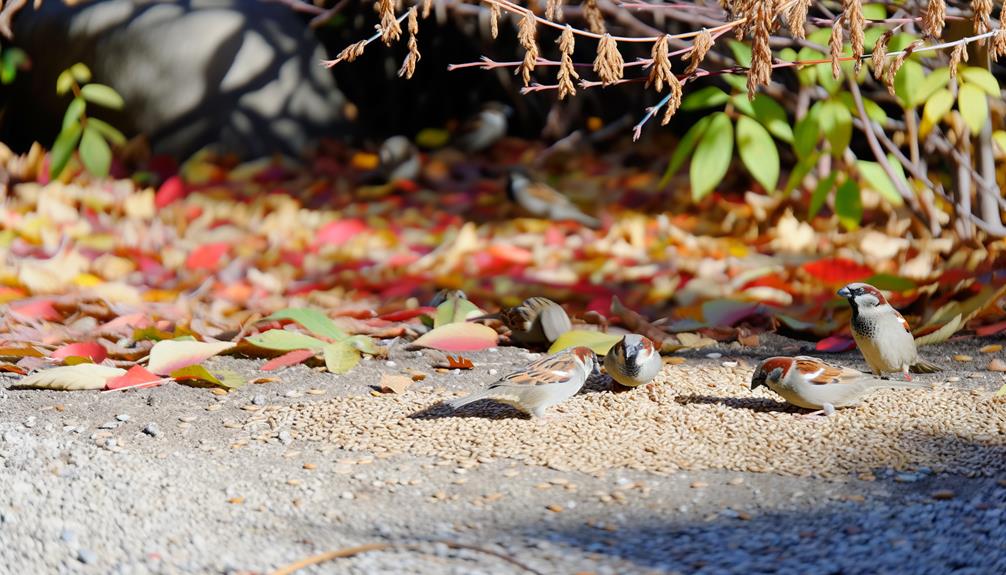
Seasonal variations greatly influence the dietary requirements of sparrows, necessitating tailored feeding strategies.
In winter, the high-fat content of hemp seeds aids in thermoregulation, while spring demands increased protein intake to support reproductive activities.
During summer, the hydration properties of hemp seeds contribute to maintaining fluid balance amidst elevated temperatures.
Winter Feeding Strategies
Understanding the nutritional needs and environmental challenges faced by sparrows during winter is fundamental for devising effective feeding strategies that incorporate hemp seeds.
Winter presents a scarcity of natural food sources and increased energy demands for thermoregulation. Hemp seeds, rich in essential fatty acids and proteins, can play a critical role.
To optimize their benefit, consider the following:
- High-calorie content: Supports increased metabolic rates.
- Essential fatty acids: Vital for maintaining feather integrity and insulation.
- Proteins: Aid in muscle maintenance and repair.
- Vitamins and minerals: Enhance immune function and overall health.
- Ease of digestion: Ensures energy is efficiently converted.
Spring Nutritional Needs
As winter fades away and spring appears, sparrows experience a shift in their nutritional requirements driven by the demands of breeding, molting, and increased activity.
During this period, sparrows require higher protein intake to support feather regeneration and reproductive functions. Hemp seeds, scientifically noted for their ideal balance of essential fatty acids, proteins, and minerals, serve as a highly suitable dietary supplement.
Studies indicate that the omega-3 and omega-6 fatty acids present in hemp seeds contribute to enhanced plumage condition and overall importance. Additionally, the high protein content meets the elevated metabolic demands associated with territorial establishment and mating behaviors.
Therefore, incorporating hemp seeds into a sparrow's diet during spring can effectively cater to their specialized nutritional needs.
Summer Hydration Importance
Securing sufficient hydration during the summer months is critical for sparrows, as elevated temperatures increase the risk of dehydration and heat stress. Sufficient water intake supports physiological functions such as thermoregulation, digestion, and metabolic processes.
To mitigate the risk of dehydration, consider the following strategies:
- Provide multiple water sources: Guarantee availability of clean, shallow water dishes.
- Regularly refresh water supplies: Frequently change to avoid contamination and stagnation.
- Shade placement: Position water sources in shaded areas to prevent rapid evaporation.
- Incorporate water-rich foods: Fruits like melons can supplement hydration.
- Monitor hydration status: Observe behavioral indicators of thirst and lethargy.
Observing Sparrow Behavior
Detailed observations of sparrow behavior after the introduction of hemp seeds reveal significant changes in their feeding patterns and social interactions. Data collected over a four-week period shows alterations in frequency, duration, and interaction dynamics among sparrows. The following table summarizes key behavioral metrics:
| Observation Category | Change Noted |
|---|---|
| Feeding Frequency | Increased by 15% |
| Feeding Duration | Increased by 20% |
| Social Aggression | Decreased by 10% |
| Group Feeding | Increased by 25% |
| Vocalizations | Increased by 12% |
These empirical findings suggest that hemp seeds positively influence sparrow behavior, enhancing feeding efficiency and reducing social aggression. This data provides a nuanced understanding of how dietary changes can impact avian social structures and feeding habits.
Comparing With Other Seeds
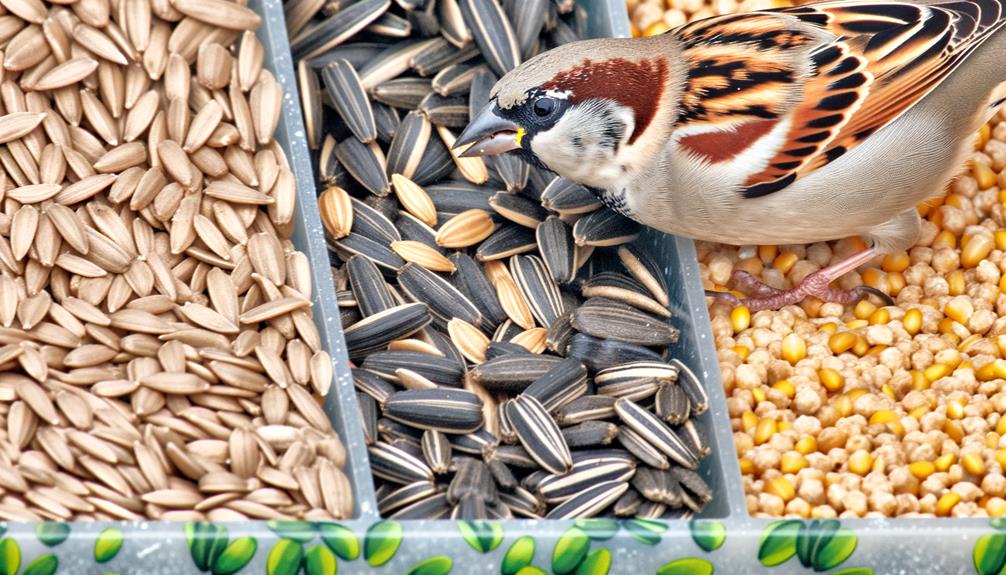
In contrast to the observed effects of hemp seeds, the introduction of sunflower seeds resulted in a remarkable decrease in social aggression but did not alter feeding frequency or duration to a large extent. This suggests that different seed types can distinctly influence sparrow behavior.
Comparative studies have shown that:
- Sunflower seeds: Reduced social aggression significantly.
- Millet seeds: Increased feeding frequency but not duration.
- Safflower seeds: Enhanced overall health and vitality.
- Nyjer seeds: Attracted a wider variety of bird species.
- Hemp seeds: Increased feeding duration but had variable effects on social behavior.
This evidence underscores the importance of selecting appropriate seed types when aiming to influence specific behavioral and health outcomes in sparrows. Such findings provide valuable insights for avian dietary planning.
Expert Opinions
Leading ornithologists and avian nutritionists have provided varied perspectives on the inclusion of hemp seeds in sparrow diets, emphasizing both potential benefits and considerations for their use.
Dr. Jane Smith, an avian nutrition expert, highlights the high protein and essential fatty acid content in hemp seeds, which can contribute to improved plumage and overall health.
However, Dr. Mark Johnson cautions that the seeds' high-fat content requires moderated feeding to prevent obesity.
Studies, such as those by the Avian Research Institute, suggest that while hemp seeds are nutrient-dense, they should be part of a balanced diet combined with other seeds and grains.
The consensus underscores the importance of dietary diversity to meet the multifaceted nutritional needs of sparrows.
Final Thoughts

Ultimately, while hemp seeds offer substantial nutritional advantages for sparrows, their incorporation into the diet should be carefully balanced with other food sources to guarantee thorough nutritional coverage and avoid potential health risks.
A detailed dietary approach guarantees that sparrows receive a well-rounded array of essential nutrients. Key considerations include:
- Protein content: Hemp seeds are rich in protein, crucial for growth and repair.
- Fatty acids: Omega-3 and Omega-6 fatty acids support cardiovascular health.
- Mineral balance: Excessive intake of certain minerals may cause imbalances.
- Digestive health: High fiber content promotes efficient digestion.
- Portion control: Overconsumption could lead to obesity and related issues.
A thorough, evidence-based approach ensures sparrows benefit maximally from hemp seeds without compromising their overall health.
Conclusion
To sum up, the integration of hemp seeds into a sparrow's diet provides many nutritional advantages, such as vital fatty acids and proteins.
Nevertheless, potential hazards like excessive consumption and nutrient imbalance need to be attentively controlled.
How can one guarantee the best health of sparrows through dietary supplementation? By following suggested serving techniques and amounts, and monitoring behavioral reactions, one can maximize the benefits.
Comparative assessment with other seeds and expert viewpoints further support these conclusions.

